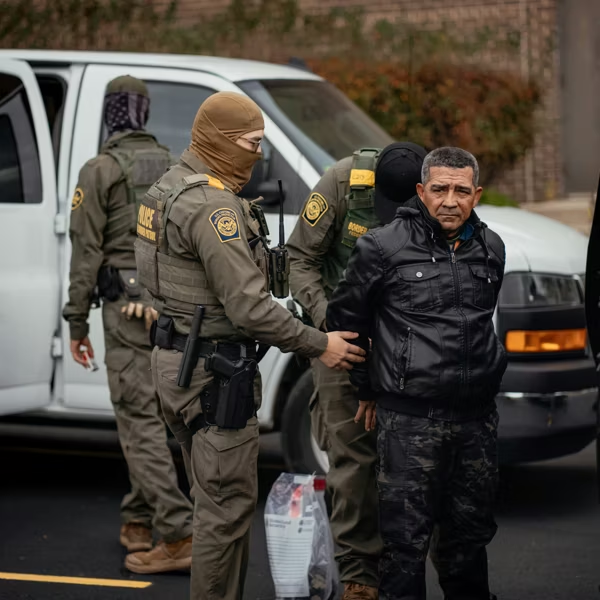When Interpol Cares about Sexual Assault
Julian Assange turned himself in Tuesday -- he's been arrested and is being held without bail in London ahead of a hearing on extradition to Sweden. The head of the "stateless" news-leak organization WikiLeaks is accused of sexual assault --and let's be clear, he should face the charges. But since when is Interpol [the investigative arm of the International Criminal Court at The Hague] so vigilant about violence against women? If women's security is suddenly Interpol's priority -- that's big news!
Tell it to hundreds of women in US jails and immigration detention centers -- who charge that they can't get justice against accused rapists -- or women in the US military (two of out three of whom allege they've experienced assault.) In Haiti hundreds of unprosecuted cases of rape in refugee camps could use some of Interpol's attention.
To come back to earth... It seems we only care about women's bodies when there's a political point to be proved. Feminist lawyers had to fight for years for the Criminal Court to take rape in Bosnia and Congo seriously. Feminist journalists wrote for years about the treatment of women under the Taliban, but it wasn't until they needed to sell a war that US politicians cared--and invaded.
Years later, Assange's organization ever-so-inconveniently leaked thousands of Afghan war logs and diplomatic cables about that war, and women's bodies are again the pretext for action.
So yes, if Assange is accused of assault, he should face charges. So should football players (professional and college), politicians, film directors, and everyday Joes.
But until some of those others start getting scooped up by Interpol and extradited, let's not pretend that this is the dawning of a brave new era in sexual assault prosecution, shall we?
An Urgent Message From Our Co-Founder
Dear Common Dreams reader, The U.S. is on a fast track to authoritarianism like nothing I've ever seen. Meanwhile, corporate news outlets are utterly capitulating to Trump, twisting their coverage to avoid drawing his ire while lining up to stuff cash in his pockets. That's why I believe that Common Dreams is doing the best and most consequential reporting that we've ever done. Our small but mighty team is a progressive reporting powerhouse, covering the news every day that the corporate media never will. Our mission has always been simple: To inform. To inspire. And to ignite change for the common good. Now here's the key piece that I want all our readers to understand: None of this would be possible without your financial support. That's not just some fundraising cliche. It's the absolute and literal truth. We don't accept corporate advertising and never will. We don't have a paywall because we don't think people should be blocked from critical news based on their ability to pay. Everything we do is funded by the donations of readers like you. Will you donate now to help power the nonprofit, independent reporting of Common Dreams? Thank you for being a vital member of our community. Together, we can keep independent journalism alive when it’s needed most. - Craig Brown, Co-founder |
Julian Assange turned himself in Tuesday -- he's been arrested and is being held without bail in London ahead of a hearing on extradition to Sweden. The head of the "stateless" news-leak organization WikiLeaks is accused of sexual assault --and let's be clear, he should face the charges. But since when is Interpol [the investigative arm of the International Criminal Court at The Hague] so vigilant about violence against women? If women's security is suddenly Interpol's priority -- that's big news!
Tell it to hundreds of women in US jails and immigration detention centers -- who charge that they can't get justice against accused rapists -- or women in the US military (two of out three of whom allege they've experienced assault.) In Haiti hundreds of unprosecuted cases of rape in refugee camps could use some of Interpol's attention.
To come back to earth... It seems we only care about women's bodies when there's a political point to be proved. Feminist lawyers had to fight for years for the Criminal Court to take rape in Bosnia and Congo seriously. Feminist journalists wrote for years about the treatment of women under the Taliban, but it wasn't until they needed to sell a war that US politicians cared--and invaded.
Years later, Assange's organization ever-so-inconveniently leaked thousands of Afghan war logs and diplomatic cables about that war, and women's bodies are again the pretext for action.
So yes, if Assange is accused of assault, he should face charges. So should football players (professional and college), politicians, film directors, and everyday Joes.
But until some of those others start getting scooped up by Interpol and extradited, let's not pretend that this is the dawning of a brave new era in sexual assault prosecution, shall we?
Julian Assange turned himself in Tuesday -- he's been arrested and is being held without bail in London ahead of a hearing on extradition to Sweden. The head of the "stateless" news-leak organization WikiLeaks is accused of sexual assault --and let's be clear, he should face the charges. But since when is Interpol [the investigative arm of the International Criminal Court at The Hague] so vigilant about violence against women? If women's security is suddenly Interpol's priority -- that's big news!
Tell it to hundreds of women in US jails and immigration detention centers -- who charge that they can't get justice against accused rapists -- or women in the US military (two of out three of whom allege they've experienced assault.) In Haiti hundreds of unprosecuted cases of rape in refugee camps could use some of Interpol's attention.
To come back to earth... It seems we only care about women's bodies when there's a political point to be proved. Feminist lawyers had to fight for years for the Criminal Court to take rape in Bosnia and Congo seriously. Feminist journalists wrote for years about the treatment of women under the Taliban, but it wasn't until they needed to sell a war that US politicians cared--and invaded.
Years later, Assange's organization ever-so-inconveniently leaked thousands of Afghan war logs and diplomatic cables about that war, and women's bodies are again the pretext for action.
So yes, if Assange is accused of assault, he should face charges. So should football players (professional and college), politicians, film directors, and everyday Joes.
But until some of those others start getting scooped up by Interpol and extradited, let's not pretend that this is the dawning of a brave new era in sexual assault prosecution, shall we?

